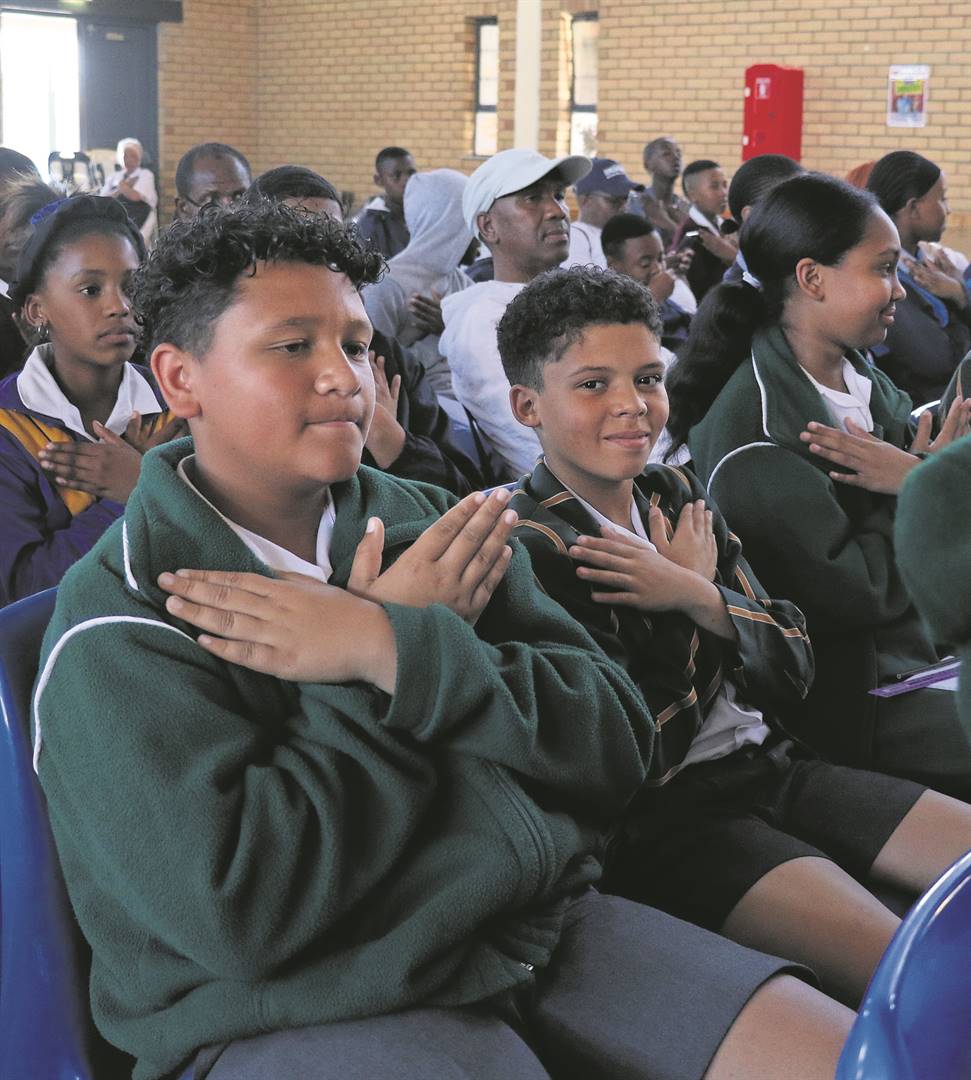
Around 450 learners from primary schools in the Metro East Education District (MEED) attended an indaba on mental health and cyberbullying on Saturday 14 October at Kuils River Technical High School organised by education psychologists at MEED.
Moses Xakwe spoke about cyberbullying and different roles involved such as the instigator, reinforcer, defender (who eventually reports it) and the bystander (who sees it but does not care to report).
He explained bullying is a planned and deliberate show of power by downplaying others and is different from teasing.
Cyberbullies hide behind electronic devices and form groups to target someone, posting memes or fight videos and so on.
Xakwe said it affects children of ages 9 to 14 that have daily access to cellphones. (If older than 14 it is seen as stalking or harassment).
“Cyberbullies are power hungry, they seek attention from their peers, they want reaction and to control others by fear.” Xakwe said it could also be a person that was bullied before.
He explained that cyberbullying has devastating emotional effects on the victims because of the permanence (it stays online), the vast audience and the speed at which it can spread.
Xakwe warned that cyberbullying is a criminal offense. “Save evidence, keep a screenshot.”
“Teachers must be digital savvy. Teach kindness, respect each other, do not be a bystander, report. Remember the golden rule: “Do to others what you would have them do to you.”
Cyber Safety
Nomfundo Ralante of the Film and Publication Board spoke to the learners about their digital footprint and cyber safety.
She asked learners to indicate if they have seen or played Grand Theft Auto (GTA). There were plenty of hands. One boy who volunteered to tell, said: “It’s about gangsters killing each other.” He also mentioned “sexual harassment, casinos and drugs.”
Some of the learners guessed the age restriction to be around 13. Ralante said it is 18+. Many of the adults in the room were clearly surprised to learn how many primary school learners knew of GTA.
Most of the learners indicated that they have a cellphone.
“It is safe to give a child a cellphone at age 10 to 13, but a smartphone only after age 13 or 14.”
Ralante warned that the adage “do not talk to strangers’’ extends to social networks.
“People lie on social media about who they are, people go and impersonate others, they do not give correct details.”
A video of an experiment in which a man pretending to be a 15-year-old boy befriends three girls (ages 12, 13, and 14) on Facebook and convinces them to meet up with him was shown to illustrate this.
Ralante warned not to share too much personal details in online profiles.
“People also look at the background of photos you post.” Displaying wealth could attract the wrong kind of attention. She told of a man who pretended to be a 14-year-old girl who eventually lured a boy to send “her” a nude photograph of himself (after he sent “hers”).
“He then asked for money or else he would share the photograph.” The boy eventually committed suicide.”
Ralante said learners should THINK before posting. Before sending ask: T – is it true, H - is it helpful, I – is it inspiring, N – is it necessary, and K – is it Kind?
Ralante warned about the internet’s long memory – what may seem “cool” to learners now, like holding a bottle of alcohol or smoking, could jeopardise them one day when potential employers see it.
“There must never be any nude photographs on your cellphone. Remember we lose cellphones, or they are taken from us, or we take them for repairs. That person repairing your phone has access to everything on it.”
Mental health
Social worker and councillor Rene Botha said mental health is about “how we think, act, and feel”.
She said as individuals everyone’s experience of mental health is not the same, but all of us need some supportive relationships, an ability to adapt to change and to realise our potential.
Losing interest in activities that one used to enjoy, low energy or feeling tired all the time, not sleeping well, not taking care of one’s body, and distractive behaviour or thoughts of harming yourself, are some of the signs of mental illness, Botha said.
She talked about the two main mental health issues in South Africa, depression and anxiety.
“Depression as a mental illness is not a normal sadness but a deep sadness that one experience two-weeks straight.”
Botha said signs of anxiety include excessive worry, a rapid heartbeat, shortness of breath, dizziness or nausea, sweating, and numbness.
“Anxiety is part of life, but we must distinguish between everyday worry and unhealthy worry.”
She explained everyday worries can be worrying about an exam, or an argument or about being embarrassed if something happened at school, or before a stage performance.
“Unhealthy worry is worrying constantly about every little thing. Your day is filled with worry, and you avoid social situations.”
Botha suggested learners do the “butterfly hug” when they feel overwhelmed by an everyday worry. “It helps us regulate our bodies and our brains, to calm us down. When we are calm, we are better at making good choices.”
She encouraged learners to find help when they realise their problem is not going away.
“You are the one responsible for your mental health, but there are people around you, teachers, social workers, they are there to help you and support you.”
The morning was ended off with a feedback session. Several took notice to think carefully before posting. Other comments included: “Stop playing GTA”, “we must stand together against bullies” and “report bullies”.
A girl said she learnt what the difference is between depression and anxiety. “Do not trust strangers on social media,” said another.




 Publications
Publications
 Partners
Partners
























